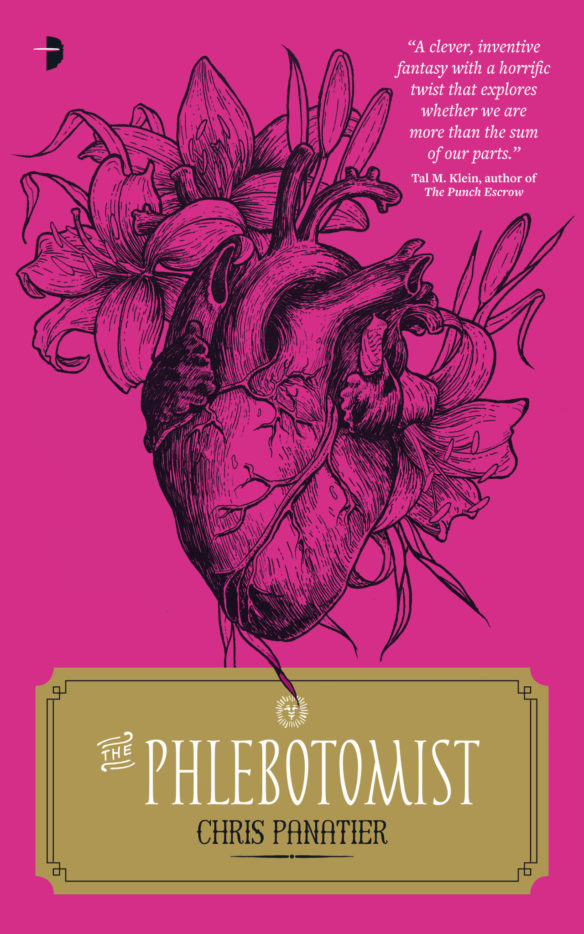
Chris Panatier 
Chris Panatier lives in Dallas, Texas, with his wife, daughter, and a fluctuating herd of animals resembling dogs (one is almost certainly a goat). He writes short stories and novels, “plays” the drums, and draws album covers for metal bands.
By Chris Panatier: A number of readers have remarked that my debut sci-fi/dystopian novel, The Phlebotomist, has a realistic feel and that many of the events depicted in its pages “could really happen today.” These points may actually undersell the parallels between our current reality and the world of the book. In fact—and this is the subject of a conversation I’ve had with other writers already — we need to up our game if we’re going to present a dystopian vision of the future. The year 2020 has sped up the clock, blurring the line between reality and dystopia such that there is a real possibility that “dystopian” ceases to be a separate genre. They’ll just call it “contemporary fiction.”
Like other authors who want their future stories to be plausible, I extrapolated the present to the future, doing my best to gauge where our trajectory might have us in another forty-seven years. But some elements of the story I didn’t have to extrapolate to at all; they exist today. I just cranked them up a bit. The following are a few examples from the book that were direct extrapolations from our present world.
The concept of media control is hardwired into the DNA of dystopian storytelling, and so my including it was hardly revelatory. However, the timing of this story makes it feel particularly chilling. In The Phlebotomist, all media is controlled by the State. The “state” is ambiguous, as from our main character’s point of view, it is indistinguishable from the blood contractor she works for, a massive conglomerate called Patriot. If you want to watch television, you tune to “the Channel”, which is run by Patriot. The most popular show is called “The Patriot Report”. News is beamed to your ‘touchstone’ (a handheld device provided by Patriot) in the form of “PatrioCasts” which advise of current blood demands, price changes, and any news deemed fit to transmit. By controlling media, the government both manipulates the truth and prevents organized dissent.
The seedlings of state-run media have already sprouted in the United States. Other countries have been there for decades. America has a handful of very powerful media companies and groups that have made it their mission to broadcast “news” that is aligned with government positions or simply to damage the value of facts. The popularity, volume, and intensity of these dispatches threaten to wash other voices out. A fire hose versus a squirt gun. In the world of The Phlebotomist, the fire hose has won out.
Next, there’s the food. In the geographically ambiguous world of The Phlebotomist, there is a mandatory blood draw called “The Harvest.” Those who can manage to give more, earn cash selling extra. Price is dictated by blood type and society has become segregated according to it. But even those who can earn more money because of favorable genetics are relatively poor, and there are a paltry few jobs. Rather than subsidize people’s income in order to allow them to buy necessities, the government, through Patriot, provides food directly with bi-monthly distributions of something called “The Box.” The Box is a literal box containing little more than cheap staples to provide basic nourishment—just enough, really, to keep people alive. If a recipient misses the Harvest, they are removed from The Box program and must fend for themselves.
This idea sounds extreme, I know, but hear me out: I stole it from Donald Trump. Just google the “American Harvest Box”. This was an idea the President of the United States proposed in 2018, and it was a perfect way for me to capture how authoritarian regimes dehumanize their poorer citizenry. Fortunately, Trump’s idea was roundly rejected by just about all stakeholders and hasn’t become part of the American story. Yet.
Lastly, polarization. Today, we stand squarely in the muck of a post-truth world, where people have a hard time discerning what is true and what is false, and where swaths of the citizenry are told that certain groups are coming for their jobs, their homes, their families, and their way of life. This intentional division of the population serves two purposes: one is to make it easier to push a narrative without the necessity of facts to support it; the second is to weaken the citizenry by dividing it. In The Phlebotomist, where the economy is founded upon blood, the government foments paranoia about bloodborne illnesses, making neighbors suspicious, thus pitting one against the other. People spy on their fellow citizens while the state encroaches.
I believe that what makes dystopia attractive to readers is that tinge of fear it transmits; that what the pages contain could happen in real life. And to keep that fear on simmer without boiling over and evaporating, a dystopian vision has to be plausibly tied to our current world. How well does that future vision relate to what we already know? What I did for The Phlebotomist was to take the present and simply nudge it to the brink. My goal was to write believable, (fun!), dystopian adventure.
I just hope it remains fiction.
ABOUT THE PHLEBOTOMIST
In a near future where citizens are subject to the mandatory blood draw, government phlebotomist Willa Wallace witnesses an event that makes her question her whole world…
To recover from a cataclysmic war, the Harvest was instituted to pass blood to those affected by radiation. But this charitable act has led to a society segregated entirely by blood type. Government blood contractor, Patriot, rewards your generous gift based on the compatibility of your donation, meaning that whoever can give the most, gets the most in return.
While working as a reaper taking collections for the Harvest, Willa chances upon an idea to resurrect an obsolete technique that could rebalance the city. But in her quest to set things into motion, she uncovers a horrifying secret that cuts to the heart of everything.
CHRIS PANATIER ON SOCAL MEDIA
- Twitter — @chrisjpanatier
- Instagram — @chrispanatier
- Website – https://chrispanatier.com/
Discover more from File 770
Subscribe to get the latest posts to your email.

This was really one of the best and most cogent things I’ve seen you publish, Mike. The author has explicated the principals that are the roots of science fiction and made the process of writing this kind of story extremely clear. Thank you for giving this writer a podium, and I thank the writer for avoiding all the fashionable pitfalls that have made so much mire in the field. This was really simple and brilliant.